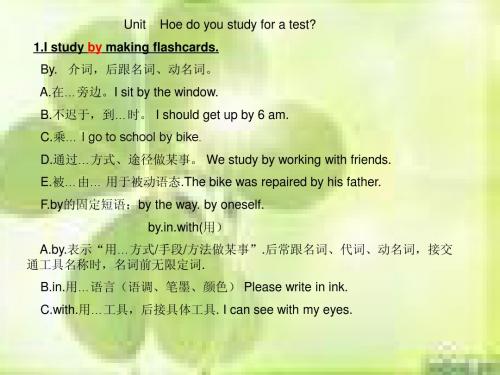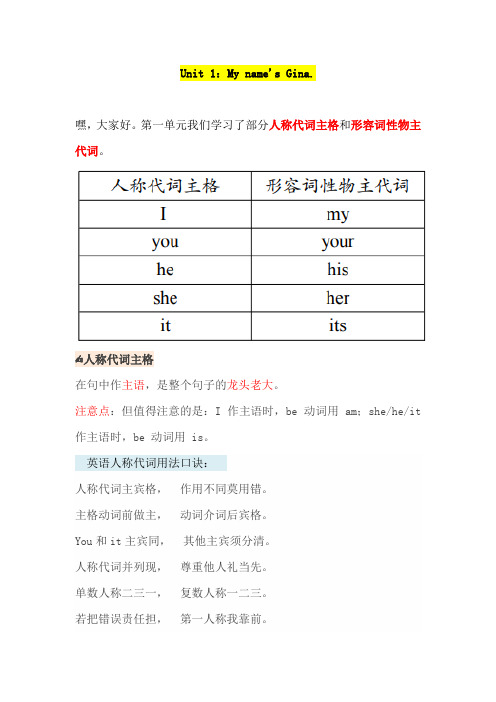U1语法及知识点
九年级英语Unit1 语法

句子种类与简单句的基本句型【学习目标】▲ 掌握什么叫简单句。
▲ 能理解根据句子的功能,把简单句分成 4类。
▲掌握各种类型的句子的结构。
【知识要点】只有一个主语 (或并列主语)和一个谓语(或并列谓语)的句子叫简单句。
1.根据句子的结构,简单句可分为5种:(1)S+V(2)S+V+O(3)S+V+P(4)S+V+InO+DO(5)S+V+O+C此外,还有 there be句型,这一句型具有就近原则,也即谓语动词用单数还是复数要看接近于be动词的那个名词。
2.根据句子的功能,简单句可分为4类:陈述句、疑问句、祈使句、感叹句(一)陈述句1.肯定式2.否定式(1)加not构成的否定句(2)由no, hardly, never, nobody, nothing等构成的否定句。
其中两者的全部否定用 neither或nor,部分否定用both +not.如: Neither of them knows French.Both of them don't know French.三者或三者以上的全部否定用 none, nothing, nobody, no one等,部分否定用all, many, every加not构成如:(二)疑问句按结构可分为四种1.一般疑问句:(1)用Yes,No来回答的疑问句。
(2)往往把be,助动词,情态动词置于句首。
例:Do you like apples? Yes,I do\ No, I don’t2.特殊疑问句:用疑问代词或疑问副词提问的句子,不用Yes,No回答。
(1)疑问词作句子的宾语、状语、表语或修饰这三种成份时,用疑问词+一般疑问句,如: When will you go?(2)疑问词作主语或主语的定语时,与陈述句的顺序相同,如:Whose father works in Shanghai?Who is on duty today?3.反意疑问句(1)构成:陈述句+ 简略问句肯定否定否定肯定简略问句的主语与陈述句保持一致,只能用人称代词 (there除外),简略问句的谓语动词也与陈述句保持一致,如果是否定,一定要用简写。
七年级上册英语译林u1知识点

七年级上册英语译林u1知识点英语作为一门重要的语言,在我们学习生活中一直扮演着重要的角色。
对学习英语的初学者,我们需要了解一些基本的知识点。
本文将带领大家逐一了解七年级上册英语译林U1的知识点。
一、基本语法1. 一般现在时态:表示现阶段的状态,或者经常发生的事情。
例如:I study every day.(我每天学习。
)2. be动词的用法be动词有三种形式:am, is, are。
例如:I am a student.(我是一名学生。
)3. 一般过去时态:表示过去发生的事情。
例如:I studied yesterday.(我昨天学习了。
)4. 疑问句疑问句中需要在句首加助动词,但be动词例外。
例如:Do you like English?(你喜欢英语吗?)5. 否定句在句子前加上not,表示否定。
例如:I do not like math.(我不喜欢数学。
)二、基本词汇1. numbers(数字)2. colors(颜色)3. days of the week(一周的日子)4. months(月份)5. seasons(季节)6. school subjects(学校科目)7. classroom objects(教室物品)8. family members(家庭成员)9. nationalities(国籍)三、日常用语1. 问候语Greeting(问候)是日常生活中常用的交流方式,例如:Good morning!(早上好!)Good afternoon!(下午好!)Good evening!(晚上好!)2. 自我介绍当我们遇到新的人时,需要进行自我介绍,例如:Hello, my name is XXX.(你好,我的名字是XXX。
)3. 感谢和赞美当收到帮助或者赞美时,需要用到以下语句:Thank you very much.(非常感谢你。
)You are very kind.(你非常善良。
)四、阅读技巧1. 理解文章主题通过文章中的关键词语和段落结构,可以帮助我们理解整篇文章的主题。
八年级上册英语u1语法知识点

八年级上册英语u1语法知识点英语语法对于学习英语而言是非常重要的一部分,尤其是对于初中学生来说,掌握语法知识点是很有必要的。
本文将重点介绍八年级上册英语U1中的一些常用语法知识点,帮助大家更好地学习英语。
一、动词时态动词时态是英语语法中最基本也是最常用的部分,对于初学者来说掌握好动词时态是至关重要的。
在U1中,出现了以下几种时态:一般现在时、一般过去时、现在进行时。
这里我们分别来介绍一下。
1. 一般现在时一般现在时表示的是现在的状态或习惯动作,通常使用“主语+谓语动词的原形”构成,如:- I play basketball with my friends after school.(我放学后和我的朋友们打篮球。
)- She usually goes to school by bus.(她通常乘公交车去上学。
)2. 一般过去时一般过去时表示过去的状态或动作,通常使用“主语+谓语动词的过去式”构成,如:- Yesterday, I went to the park with my family.(昨天,我和我的家人去了公园。
)- He studied hard for the exam last night.(他昨晚为考试努力学习。
)3. 现在进行时现在进行时表示现在正在进行的动作,通常使用“主语+be动词+现在分词”构成,如:- They are playing basketball on the playground.(他们正在操场上打篮球。
)- I am studying for the English test now.(我正在准备英语考试。
)二、情态动词情态动词在英语语法中也是比较重要的一部分,它是用来表示说话者对某一行为的态度、意愿或可能性的动词。
在U1中,主要涉及到以下几个情态动词:can、could、may、might、must、should、would。
这里我们分别来介绍一下。
1. can和couldcan和could都表示能力和可能性。
Unit1语法知识点

D. decide+疑问句+to do 决定.
A. either. 用于否定句句尾,前用逗号隔开.
B. too. 用于肯定句、疑问句句尾,前用逗号隔开. C. also. 用于肯定句、疑问句句中,动词前,实义动词前.
D. as well.用于口语,放在句末,不用于否定句.
20. take notes (of). 记笔记,做记录. make a note of. “满意、记住、记下” . 21. look for寻找 look after照顾 look over查看 look forward to渴望 , 向往 look at看着 lookup抬头看,在……查找 look up to尊敬 look down upon瞧不起 look like看起来像 look as if/though看起来好像 look into调查 look out当心 look out of往……外看
What do you do with your camera?
25. worry about = be worried about. be worried about一般不用于祈使句. 26. be angry with sb be angry at/about sth
27. break off.
She is too happy to go shopping .
F. too前有never、not、only、but、all等词时,表“非常”,加强语气,动 词不定式表肯定. It’s never too late to learn. 5. sound.声音.自然界中各种声音,无感情色彩. the sound of breaking glass. voice.噪音、说话声、鸟叫声(可数). in a low voice 低up a story / a conversation make up of.“构成”(多用于被动语态) 23. unless=if…not 如果unless引导的分句本身就是否定句,不能用if…not代替. You will get good grades unless you do your homework. 24. deal with处理,应付.=do with. deal with,常与how连用,侧重于解决问题,强调处理问题的方法. do with,常与what连用,侧重于对某事物的利用. He has learnt to deal with difficulties.
八下英Unit 1语法总结

一、情态动词should的用法情态动词should有自己的意义,但不能单独作谓语,只能和其他动词一起构成谓语,表示说话人的态度或看法,后接动词原形。
常见用法有以下几点:1.表示劝告、建议等,意为“应该”,常指根据常理认为对的事或应该去做的事。
当劝某人做或不做某事时,常用“should do sth.”或“shouldn't do sth.”。
should 比must 和ought to 语气更加委婉。
例句:You should brush your teeth before you go to bed.你在睡觉前应该刷牙。
You shouldn't watch TV every day.你不应该每天看电视。
2.通常用来表示现在或将来的责任或义务。
例句:Children should obey their parents.孩子们应该听从他们的父母。
We should respect the old.我们应该尊敬老人。
3.表示推断,意为“应该;可能”。
例句:They should be there by now,I think.我觉得现在他们应该都已经到了。
4.用于第一人称疑问句,询问对方的意愿,表示说话人的一种谦逊、客气、委婉的语气。
例句:Should I open the door? 我可以打开门吗?What should we first ? 我们首先该干什么呢?5.表示某种感情色彩,意为“竟会”,常用于以how, why开头引导的特殊疑问句中。
例句:Why should you be so early today? 你今天为什么会如此早?二、反身代词1.反身代词的构成反身代词是一种表示反射或强调的代词。
它由第一人称、第二人称的形容词性物主代词和第三人称代词的宾格加词尾-self或selves构成。
其构成如下表:人称第一人称第二人称第三人称反身代词与它所指代的名词或代词形成互指关系,两者在人称和数上应保持一致。
新目标七年级(上册)Unit 1 语法讲解

Unit 1:My name's Gina.嘿,大家好。
第一单元我们学习了部分人称代词主格和形容词性物主代词。
✍人称代词主格在句中作主语,是整个句子的龙头老大。
注意点:但值得注意的是:I 作主语时,be 动词用 am;she/he/it 作主语时,be 动词用 is。
英语人称代词用法口诀:人称代词主宾格,作用不同莫用错。
主格动词前做主,动词介词后宾格。
You和it主宾同,其他主宾须分清。
人称代词并列现,尊重他人礼当先。
单数人称二三一,复数人称一二三。
若把错误责任担,第一人称我靠前。
✍形容词性物主代词具有形容词的特性,常放在名词前面作定语,表明该名词所表示的人或物是"谁的"所以我不能单独使用,其后必须跟名词。
比如:my name; your friend……英语物主代词用法口诀:物主代词分两种,形容词性名词性。
形容词性能力差,自己不能来当家。
句子当中作定语,身后定把名词加。
物主代词名词性,相当名词可单用。
句中充当主宾表,身后没有名词影。
两种代词形不同,添个 s 形变名。
his,its不用变,my变mine要记清。
经典例句1人称代词主格1. I am a girl. 我是一个女孩。
2. He/She is my friend. 他/她是我的朋友。
3. You are very nice. 你非常好。
4. It is a bed. 它是一张床。
2形容词性物主代词5. My name is Mary. 我的名字叫玛丽。
6. Your room is so tidy. 你的房间很整洁。
7. This is his/her pen. 这是他/她的钢笔。
8. That is my dog. Its name is Susan.那是我的狗。
它的名字叫苏珊。
9.He's a student. His mother is a teacher. 他是一名学生。
他妈妈是一位教师。
七年级英语下册u1知识点总结
七年级英语下册u1知识点总结第一部分:词汇1. 名词:人名、地名、物品、动物等例如:book(书)、computer(电脑)、dog(狗)2. 动词:表示动作和状态例如:run(跑)、eat(吃)、sleep(睡觉)3. 形容词:描述名词的特征和状态例如:big(大)、happy(快乐)、black(黑色的)4. 副词:修饰动词、形容词和其他副词例如:slowly(慢慢地)、very(非常)、pretty(相当)5. 数词:表示数量例如:one(一个)、two(两个)、three(三个)6. 代词:代替名词例如:he(他)、she(她)、it(它)7. 冠词:用于修饰名词的限定词例如:a(一)、an(一)8. 介词:介绍人或物与其他事物的位置关系例如:in(在)、on(在…上面)、under(在…下面)9. 连词:用于连接词、句子或短语例如:and(和)、but(但是)、or(或者)第二部分:语法1. 一般现在时例如:I eat breakfast every day.(我每天吃早饭。
)2. 一般过去时例如:She watched TV last night.(她昨天晚上看电视。
)3. 一般将来时例如:I will go to the park tomorrow.(我明天会去公园。
)4. 否定句和疑问句例如:He does not play soccer.(他不踢足球。
)Do you like ice cream?(你喜欢冰激凌吗?)5. 句子成分:主语和谓语例如:I am happy.(我很快乐。
)He likes to sing.(他喜欢唱歌。
)第三部分:阅读理解1. 根据上下文推断单词或句子的意思例如:Can you lend me a pencil?(你能借我一支铅笔吗?)2. 阅读题干,找出相应信息例如:What time do you usually wake up? A. 6:30 B. 7:00 C. 8:00(你通常什么时候起床?A.6:30 B.7:00 C.8:00)3. 理解课文主旨,回答问题例如:What is John’s favorite sport?(约翰最喜欢的运动是什么?)4. 根据文章内容,进行连词组句例如:It is raining outside. I can’t go to the park.(外面在下雨。
七年级units1知识点
七年级units1知识点七年级 Units 1 知识点随着新学期的开始,初中七年级的同学们迎来了 Units 1 的学习。
这个单元重点学习了人称代词、情态动词以及一些疑问句等语法知识。
本文将从以下几个方面介绍 Units 1 的知识点。
一、人称代词人称代词分为主格形式和宾格形式,主格形式代替主语,宾格形式代替宾语。
如:1. 主格形式:I, you, he, she, it, we, theyI am a student. You are my friend. He is a teacher. She is a doctor. It is a cat. We are classmates. They are workers.2. 宾格形式:me, you, him, her, it, us, themShe talked to me. I saw you in the park. He helped him with his homework. We visited them yesterday.二、情态动词情态动词用来表示说话人对事情的看法,常见的有 can, could, may, might, should, would, must 等。
1. can 表示能力或许可:I can speak English. (我会说英语。
)Can you swim? (你会游泳吗?)2. could 表示过去的能力或建议:I could swim when I was young. (我小时候会游泳。
)You could try to ask him for help. (你可以试着向他求助。
)3. may 表示可能或许可:I may go to the cinema tonight. (我可能今晚去看电影。
)May I borrow your pen? (我可以借一下你的笔吗?)4. might 表示过去的可能性或允许:He might come to the party last night. (他昨晚可能参加了聚会。
牛津新版七年级上册U1语法
特殊疑问句句首的疑问词
• 特殊疑问句 • 句首用what,who,whose,which,when,where,why,how等疑问词提 问的句子成为特殊疑问句,回答不用yes/no,只针对特殊疑问
词的内容作出回答。
• • • • • • •
what什么,代表事物, which 哪一个,代表人或事物 when什么时候,询问时间, where哪里,询问地点, why为什么,询问原因, how怎样,如何,询问方式和状态, how与一些形容词连用,课构成不同含义的特殊疑问词,如: how many/much多少,how old, how long, how far, how heavy.
/p/ /b/ /ʃ/ /ʒ/ /m/ /n/ / an的用法
• • • • • • 不定冠词表示“一”或者“某一” 当不定冠词紧接的单词为辅音发音开头时,用a a boy a teacher a computer a unit a football team a volin 当不定冠词紧接的单词为元音发音开头时,用an
七年级上册U1Grammar
1、特殊疑问句 2、不定冠词a和an
1、特殊疑问句导入
句式:
肯定句:He is a doctor. They go to school by bike. 否定句:He isn’t a doctor. They don’t go to school by bike. 一般疑问句: Is he a doctor? Do they go to school by bike? 特殊疑问句: What is he? How do they go to school?
• Thank you
• Who broke the window? • Which book is yours? • Whose bag is it?
九年级上册英语U1知识点
九年级上册英语U1知识点九年级上册英语U1 知识点九年级上册英语U1是初中英语教材中的第一个单元,主要涵盖了一些基础的语法知识和词汇。
以下将对该单元的知识点进行详细的阐述。
一、动词的时态和语态动词的时态是我们学习英语的重要内容之一。
在九年级上册英语U1中,我们学习了一般现在时、过去时和将来时的用法。
1. 一般现在时一般现在时表示习惯性、经常性的动作或者客观事实。
例如:I go to school every day.(我每天去学校。
)2. 过去时过去时表示已经发生的动作或者存在的状态。
例如:She studied English last night.(她昨晚学习了英语。
)3. 将来时将来时表示将要发生的动作或者存在的状态。
例如:I will visit my grandparents next week.(下周我将会去拜访我的祖父母。
)此外,九年级上册英语U1还涉及了动词的语态。
英语中的动词有主动语态和被动语态之分。
被动语态表示主语是动作的接受者而不是执行者。
例如:The book was written by the author.(这本书是作者写的。
)二、名词的复数形式名词的复数形式也是我们在英语学习中需要掌握的重要内容。
九年级上册英语U1中涉及了一些常用名词的复数形式变化规则。
1. 一般情况下,在名词后加-s构成复数形式。
例如:book- books, pen - pens。
2. 以-s、 -o、 -x、 -z、 -ch、 -sh结尾的名词,在末尾加-es构成复数形式。
例如:bus - buses, tomato - tomatoes, watch - watches。
3. 以辅音字母+y结尾的名词,将y改为i,再加-es构成复数形式。
例如:baby - babies, city - cities。
除了以上规则外,还有一些名词的复数形式需要特殊记忆。
例如:child - children, man - men, woman - women。
- 1、下载文档前请自行甄别文档内容的完整性,平台不提供额外的编辑、内容补充、找答案等附加服务。
- 2、"仅部分预览"的文档,不可在线预览部分如存在完整性等问题,可反馈申请退款(可完整预览的文档不适用该条件!)。
- 3、如文档侵犯您的权益,请联系客服反馈,我们会尽快为您处理(人工客服工作时间:9:00-18:30)。
Unit 1 How do you study for a test?【重要词汇概览】1. frustrating a. 令人沮丧的2. memorize v. 记忆,背诵3. pronunciation n. 发音4. flashcard n.认卡5. solution n. 解决办法6. not at all 根本(不) 全然(不)7. end up 结束,告…终8. laugh at sb. 笑话;取笑(某人)9. take notes 做笔记,做记录 10.enjoy doing sth. 喜欢做…乐意做…【知识点讲解】1.(1)I think I can study English by watching English movies because I like watching English movies. 我认为我可以通过英语电影来来学英语,因为我喜欢看电影。
(2)I don’t think I can get an English tutor because I want to learn by myself at home.我不想上英语辅导,因为我想在家自学(3)I think surfing the internet is a bad way because you have to use a computer and always waste your time. 我认为沉溺于网络是不好的,因为你不得不去使用电脑和浪费你的时间2.【语法知识聚焦】By 是个很常用的介词(有时也用作副词),在初中英语中的用法有以下几种:(1)意为“在……旁”、“靠近”。
如:有的在大树下唱歌跳舞,有的在湖边画画儿。
Some are singing and dancing under a big tree . Some are drawing by the lake.(2)意为“不迟于”、“到……时为止”。
如:Your son will be all right by supper time. 你的儿子在晚饭前会好的。
How many English songs had you learned by the end of last term?到上个学期末你们已经学了多少首英语歌曲?(3)表示方法、手段,可译作“靠”、“用”、“凭借”、“通过”、“乘坐”等。
如:The monkey was hanging from the tree by his tail and laughing.猴子用尾巴吊在树上哈哈大笑。
The boy’s father was so thankful that he taught Edison how to send messages by railway telegraph.孩子的父亲是那么的感激,于是他教爱迪生怎样通过铁路电报来传达信息。
(4)表示“逐个”、“逐批”的意思。
如:One by one they went past the table in the dark. 他们一个一个得在黑暗中经过这张桌子。
(5)表示“根据”、“按照”的意思。
如: What time is it by your watch? 你的表几点了?(6)和take , hold 等动词连用,说明接触身体的某一部分。
如:I took him by the hand. 我拉住了它的手。
(7)用于被动句中,表示行为主体,常译作“被”、“由”等。
如:English is spoken by many people. 英语被许多人所说。
(即“许多人讲英语。
”)(8)组成其它短语。
1) by the way : 意为“顺便说”、“顺便问一下”,常做插入语。
如:By the way , where’s Li Ping , do you know? 顺便问一下,李平在哪儿。
你知道吗?2) by oneself : 意为“单独”、“自行”。
如:I can’t leave her by herself. 我不能把她单独留下。
3) by and by : 意为“不久以后”、“不一会儿”。
如:But by and by , more and more people began to study English.但是不久以后,越来越多的人开始学英语了。
二、动名词的构成动词后加动名词doing,相当于名词,在句子中可以做主语、宾语、表语定语等。
1)作主语Fighting broke out between the South and the North.南方与北方开战了。
2)作宾语(请问你介意调小一点收音机的音量吗?)Would you mind turning down your radio a little, please?3)作表语(保姆的工作是洗衣服,作饭和照看孩子。
)Babysister’s job is washing,cooking and taking care of the children。
练习:一. Match the questions and answers1. Have you ever worked with flashcards?2. Do you ever ask the teacher for help in your English class?3. Do you like to work in a group?4. Does reading aloud help you?5. Do you like to study grammar?6. What helps you study for a test?a. No, grammar is too boring.b. Yes, reading aloud helps my pronunciation.c. Yes, but I didn’t like them.d. Yes, the teacher is helpful.e. I think watching English-language TV helps me study.F. No, I don’t. Why would wo rking in a group help?二. Close testTime spent in a bookshop can be enjoyable. If you go to a 1shop, no assistant (营业员) will come near to you and say, “Can I help you?” You 2buy anything you don’t want. You may try to find out3the book you want is . But if you fail, the assistant will lead (引导) you there and then he will go away. It seems that he is 4selling any books at all.There is a story which tells us about a good shop. A medical (医学的) student 5 a very useful book in the shop, 6it was too expensive for him to buy. He couldn’t get it from the library, either. So every afternoon, he went there to read 7at a time. One day, however (然而), he couldn’t find 8from its usual place and was leaving when he saw an assistant signing (示意) to him. To his surprise, the assistant pointed to the book9, “I put it there so as not to be sold out.” Said the assistant. Then he 10the student to go on with his reading.1. A. good B. bad C. cheap D. expensive2. A. shouldn’t B. needn’t C. mustn’t D. can’t3. A. what B. which C. where D. when4. A. surprised at B. not surprised at C. interested in D. not interested in5. A. bought B. found C. read D. took6. A. but B. and C. so D. or7. A. little B. a little C. few D. a few8. A. the book B. the shop C. the assistant D. the shopkeeper9. A. in a bookshop B. in his hand C. in a corner D. in his pocket10. A. left B. let C. helped D. taught三.Reading comprehensionLet children learn to judge (判断) their own work. When children learn to speak, other people do not correct (纠正) their mistakes all the time. If we correct too much, they will stop speaking. Letthemselves understand the difference between the language they speak and the language other people around them speak. Day after day, they will make some changes to make their language like other people's language. In the same way, children can learn to do many other things without others' help. For example, to walk, run, climb, and ride a bike-make themselves understand how they should do it. Slowly they can make some changes they need.But in school we never let a child himself find out his mistakes and correct them for himself. We usually think he never knows his mistakes if we do not tell him or he never corrects them if we do not make him do it. We should try to let him find out the answers to the problems, and the good ways of working them out with the help of other children if he wants.Can teachers give the students answer books if they do maths problems? Let them correct their homework all by themselves. When the students tell their teachers that they can't find the ways to get the right answers, the teachers should help them. Let the students know what they must learn, how to judge their own understanding (理解力), how to know what they know or what they do not know. These are the most important.(1).they text tells us that the children should learn things by(通过) _______.A.listening to other peopleB.doing what other people doC.making mistakes and then correcting themD.asking other people many questions(2).Which of the following is right? The teachers _______.A.never give the students answersB.don't let the students make mistakesC.don't always correct the students' mistakes when they make mistakesD.only give the students the answers when they do problems(3).The writer thinks the teachers in school should _______.A.let the students help each otherB.teach the students less good waysC.correct more of their homeworkD.teach the students more book knowledge(4).This text shows that learning to speak is _______.Adifferent from learning other thingsB.a very important thingC.more important than learning other thingsD.just like learning other things做完了再看答案哟!答案及解析:一. c e f b a d二.1)选A,看下文可知与价格无关,排除C、D。
